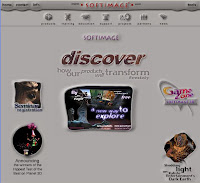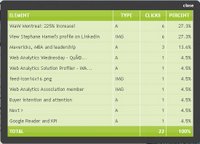M. Mohamed Kahlain, un collègue de travail et stratège chez
Desjardins.com, participera bientôt à un déjeuner-causerie qui traitera du Web 2.0.
L'Activité:
Certains experts ne jurent que par le Web 2.0 qui, par sa nature, influencerait les modèles d'affaires. Certains autres mettent en doute ce concept et attendent toujours de voir les retombées d'affaires de ce « buzzword ».
Deux stratégistes Web s'affronteront dans un débat afin de savoir si oui ou non le Web 2.0 est une avenue prometteuse pour les retombées commerciales de nos entreprises. Venez donc entendre Michel Leblanc, associé principal chez
Analyweb, blogueur réputé sur
les sujets du web 2.0 et du marketing 2.0 et Mohamed Kahlain, stratège internet de la
Fédération des Caisses Desjardins et scéptique convaincu de l'inutilité du Web 2.0 dans un contexte d'affaires.
Qui a raison ? Qui a tort ? La réponse pourrait vous ouvrir des perspectives nouvelles!
Le débat sera animé par Gilles Lajoie,
La Presse Affaires.com Date :
Date : 01 Novembre 2006
Heure : 8h à 9h30
Type : Petit déjeuner
Conférencier : Michel Leblanc, associé principal, Analyweb et Mohamed Kahlain, conseiller vente et stratégies pour desjardins.com, Fédération des Caisses Desjardins
Lieu : Le Saint Sulpice Hôtel Montréal
Salle Le Moyne/le Ber
414, rue Saint-Sulpice, Montréal
Inscription : http://www.marketing-montreal.com/amm/activites?id=607#news_item_607Mon opinion:
J'aurais bien aimé participer à cette rencontre, mais mon horaire et la distance ne me le permettent pas. Comment pallier à cette contrainte de temps et d'espace? En parler sur mon blog, dans un premier temps, et qui sait, peut-être que quelqu'un pourra l'enregistrer et la publier sur
YouTube? Peut-être même que l'expression de mon opinion résultera en une discussion et au plus grand partage de nos opinions respectives, et ce, pour le bénéfice de tous ceux qui s'y intéressent? Espace, temps, opinion, communication... voilà l'essence des principes du Web 2.0!
Prenons un premier exemple: YouTube est sans contredit un modèle d'entreprise du type Web2.0, voici d'ailleurs la définition qu'en donne
Wikipedia (un autre modèle concret et utile de Web 2.0!):
YouTube is a popular free video sharing web site which lets users upload, view, and share video clips.
Je crois qu'il y a une distinction à faire entre certains concepts qui sont associés au Web 2.0 (ou Enterprise 2.0!?) et l'espèce de vague de folie qui rappelle l'ère de la bulle Internet.
Il y a des éléments indéniables qui ont une utilité dans nos entreprises et dans nos vies. Puisque la définition exacte de ce qu'est ou n'est pas le Web 2.0 est très suggestive, voici les caractéristiques du Web 2.0 retenu sur Wikipedia:
- "Network as a platform": les concepts de "mashups" sont une concrétisation de l'impartition et de la spécialisation des services. Ceci permet en retour de se concentrer sur notre expertise d'entreprise ("core business"). Mon message précédent au sujet de MotionBased est une concrétisation d'une innovation qui n'aurait pas été possible sans le Web 2.0.
- Contrôlé par les usagers: nous sommes en contrôle de ce que nous désirons "consommer" comme service et information: quand nous voulons, où nous le voulons, et sur le média que nous voulons, et plus encore, avec une diversité de sources et d'opinions à notre disposition. Comparez simplement la page personalisée de Google à ce qu'offre Canoë sur son portail: un offre la flexibilité du design et des sources d'information alors que l'autre...
- Plateforme participative et démocratique: les technologies du Web 2.0 permettent de s'exprimer plus facilement, pour le meilleur et pour le pire, avec tout ce qu'il y a de positif et de plus noir chez l'Homme.
- Interfaces riches et conviviales: il a été démontré depuis longtemps que la richesse et la qualité de l'expérience usager contribue à l'atteinte des objectifs d'affaires. Mais pour ma part, j'aime plutôt me placer dans la perspective "utilisateur": la qualité et la richesse de l'interface facilitent l'atteinte de mes objectifs.
- Réseaux sociaux: le pouvoir marketing est entre les mains des consommateurs, qui peuvent influencer et exercer leur opinion librement et facilement. Bien utilisés, les concepts de Web 2.0 offrent des possibilités incroyables, comme le démontre la récente campagne de Dove, qui a fait rapidement le tour du monde, encouragé et alimenté par une communauté qui y a vu une valeur (le simple fait que je mentionne cette campagne sur ce blog est une concrétisation de ce concept de "réseautage social"!)
Conclusion:
Je crois que tout comme les concepts de "ebusiness", qui ont d'abord été perçus comme des recettes miracles et une panacée, le Web 2.0 évoluera au niveau d'une intégration normale et toute simple au coeur de nos vies et de nos entreprises. Le Web 2.0 est une évolution logique (et non une révolution!) qui s'exprime actuellement à travers l'expérimentation, l'innovation, une part de chaos et d'improvisation, mais qui contribuera ultimement à l'évolution des modèles d'affaires et influencera nos vies. Je ne jure pas que par le Web 2.0, mais je ne peux mettre en doute que le Web 2.0 exercera, et exerce déjà, une grande influence sur nos vies.











